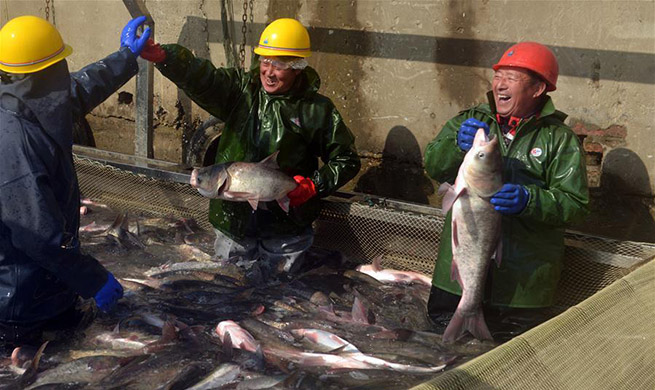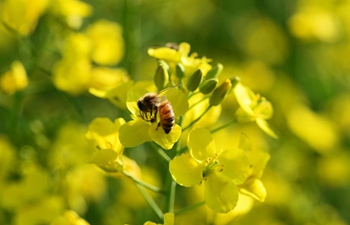HANGZHOU, Jan. 22 (Xinhua) -- At a time when rising costs are forcing many farmers to exit sericulture, a silkworm-raising factory in east China's Zhejiang Province is breathing new life into an industry that is thousands of years old.
Babei Group, a private silk necktie-producing enterprise, announced on Sunday that its first batch of mass-produced silkworm cocoons had rolled off production line, marking the success of a seven-year-long research on factory-raised silkworms.
With a total investment of 350 million yuan (51.5 million U. S. dollars), the company's silkworm workshop is able to churn out 10,000 tonnes of high-quality cocoons annually, about the total yield of 100,000 households of farmers, using less than 200 workers.
The germ-free workshop, covering an area of 5,000 square meters, creates a favorable environment with moderate temperature, airflow and humidity for the silkworms.
Instead of mulberry leaf, the worms are fed artificial fodder made of ingredients such as soybean, corn powder, sweet potato starch and vitamin complex.
The fodder is cheap to produce, and it helps improve the efficiency of silkworm raising for it is free from the limits of seasons and climate, according to Meng Zhiqi, a researcher with Zhejiang Academy of Agricultural Sciences and leading researcher of the project.
In order to boost silkworms' appetites, researchers have added mulberry leaf powder into the fodder to make it more "delicious."
Sericulture, the breeding of silkworms to produce raw silk, has long been a featured industry of Zhejiang Province, but it has been on a downward trend in recent years.
"Zhejiang could produce 80,000 tonnes of cocoons annually at its peak, but currently it has dropped to 20,000 tonnes," said Jin Yao, chairman of the company.
Facing rising silk prices brought about by the shrinking industry, Babei decided to produce its own necktie material and joined with scientists to develop silkworm raising techniques seven years ago.
It has been a bumpy road toward success. Silkworms are extremely fragile. One dead worm could cause mass deaths and lead to the breakdown of a whole production line, Jin said.
The company encountered large-scale silkworms deaths several times. Researchers carried out some 100 experiments on disease prevention and came up with effective disease prevention methods, according to Jin.
The company owns 18 patents, and it plans to further expand the silkworm raising facilities in the near future.
Qian Youqing, deputy head of China Silk Association, calls the industrialized silkworm-raising a "breakthrough" of sericulture, which can inject vitality into traditional silk culture.

















